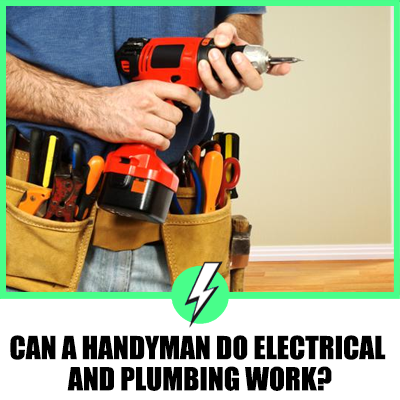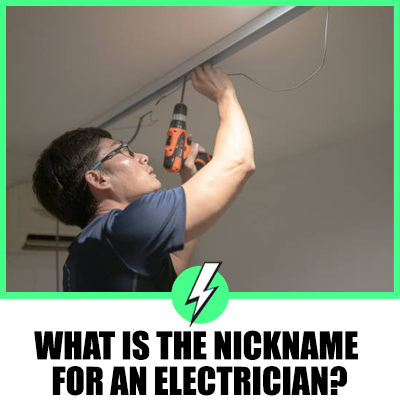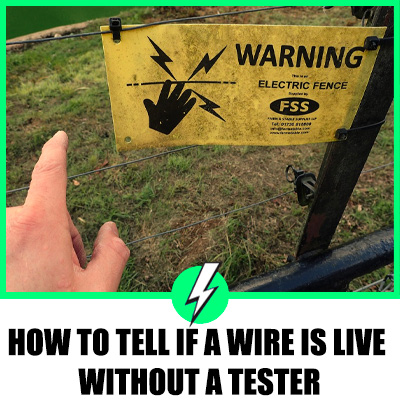Can a Handyman do Electrical and Plumbing Work?
Is this a dilemma you face when it comes to home repairs? The handyman has lower rates than the other tradespeople but can the work be trusted?
In general, you can trust the work of a reputable handyman. A good handyman with low rates is worth knowing among tradespeople. Handypersons can do electrical and plumbing work, and if part P registered can install an electric shower.

Contents
Can a plumber or handyman do electrical work?
There is a single time the plumber can do electrical work, and that is to fit an electric shower. However, the plumber must be Part P registered because this is a notifiable electrical job.
If the plumber is not part P registered, then it is unlikely that an electrician will come and sign off his work for a small fee.
A handyman can carry out simple electrical work around the home. However, the handyman cannot sign off any work or issues certificates unless he is a qualified electrician and has the required accreditations.
Do you call a plumber or an electrician for an electric shower?
It depends if the plumber is part P registered and can sign off the wiring installation. In most cases, the plumber will have an electrician who will wire the shower, sign off, and issue the certificate.
Mostly plumbers stick to what they know and do the plumbing to a high standard, leaving the electrical work to the experts.
Can I replace the electric shower myself?
There are no laws to stop you from replacing your electric shower if the wires are in place. It’s a simple job of connecting the wires and installing the riser, just a couple of screws.
If you have a problem with the shower, the onus will be on you to make good the work or call a professional electrician to undertake the work for you.
When working on your electrics in the home, there is a possible scenario where you may find your house insurance null and void if something happens like a fire.
What electrical work can a handyman do?
The handyman can do basic electrical work like changing like switches and electrical fittings, its basic electrics and if you know the handyman then this should be fine.
The problem arises when the handyman is not recommended, and you have engaged his services maybe from an advertisement in the local shop.
Botched electrical jobs are easily hidden behind fittings and sockets. You have no idea the safety of the electrical work that has been carried out on your property.
A qualified electrician will take on basic jobs and be in and out of your property quickly, and you can have the confidence the work is carried out to industry standards.
What electrical work is notifiable in England?
A qualified accredited electrician is required for notifiable work; this includes house rewiring, new installations of new circuits such as extensions to your home, or underfloor heating.
A non-certified electrician can complete notifiable work, but he still has to notify the local council, and the fee will increase from a few pounds to a few hundred pounds. This is enough to put most non-certified electricians off touching part P electrics.
What is the difference between a handyman and a plumber?
The plumber has been trained in a formal setting at college and on-site, gaining the experience needed for the job. The plumber has possibly been through a long apprenticeship to learn his trade.
A professional plumber will work on your property using the best tools for the job and leave you leak-free.
A plumber can carry out complex jobs such as completing central heating systems to underfloor heating and even simple tasks like kitchen plumbing.
A handyperson will be restricted in his knowledge and can only undertake small jobs such as placing a tap outside or repairing under-sink leaks.
How do you know if a tradesman is trusted?
- Ask to see evidence of qualifications. Most tradespeople will have an accreditation card with them.
- Ask for references if the plumber is carrying out a lot of work in your home. You can call clients they have previously worked for
- Ask to see proof of their public liability insurance.
Cowboy tradesmen will not go to the expense of public liability insurance and will certainly not have a genuine accreditation card.
What work should you let a handyman do?
The handyman can carry out simple tasks that are not worth the hassle of getting a quote for, and waiting for tradesmen to respond to a simple request may take forever, so the handyman is perfect for these types of jobs.
Do I need a License to be a handyman in the UK?
There are no formal qualifications for a handyman in the UK. However, this does not stop the handyman from enrolling in a basic electrician or plumbing course.
The course would give a qualification such as City & Guilds, NVQ Level 2 or a Btech. The courses can be done as day releases or night classes.
The advantage of having some recognisable qualifications is clear. You can offer confidence to the customer and charge more for your services while remaining competitive.
What insurance do I need as a handyman in the UK?
If you work in someone’s home or office as a handyman, you must have public liability insurance in the UK.
The insurance comes with predetermined values and is relatively cheap for the peace of mind it offers to the handyman and customer.
Is there a demand for handypersons in the UK?
If you are a good handyman, you will be inundated with work as your rates are competitive with other tradesmen.
How much does a self-employed handyman make in the UK?
You will charge an hourly rate of 15 pounds, so an 8-hour day is 120 pounds and 600 pounds for a five day week.





